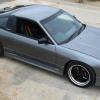RB20 No compression cylinder 1!! help!!!!
Announcements
-
Similar Content
-
Latest Posts
-
Well, the car is back, all straight and shiny, for how long for is anyone's guess After picking it up we went for a bit of a drive, Jebus I really enjoy driving this little thing, hopefully the weather let's us go for a nice long cruise this weekend as it will be out of my hands for at least a few days next week when it heads back into Mania on Monday It's weird, whilst I do always enjoy going for a drive, the NC makes me feel like a kid who has just got his first car, and they just want to drive wherever and whenever they can I really need to look into the MX5 Club of NSW
-
wow that is some seriously JDM original credibility there!
-
By robbo_rb180 · Posted
Selling hks rb25 cast manifold and waste gate. Never going to use as don't have Rb powered car Unknown condition of waste gate diaphragm $900 Pick up only Ipswich Qld -
Yeah it will surely need a diode to stop the headlight turning on when the indicator does, I'm pretty sure all it would need is a wire from the headlight parker wire (via a diode) to the indicator 12v. Assuming you also convert to LED that is....I'm not sure if the standard wiring will take the load of the extra indicator globes if they are incandescent
-
Post up or shoot me a list of anything you need (other than R34 specific), I've been meaning to move on some spares
-




Recommended Posts
Create an account or sign in to comment
You need to be a member in order to leave a comment
Create an account
Sign up for a new account in our community. It's easy!
Register a new accountSign in
Already have an account? Sign in here.
Sign In Now